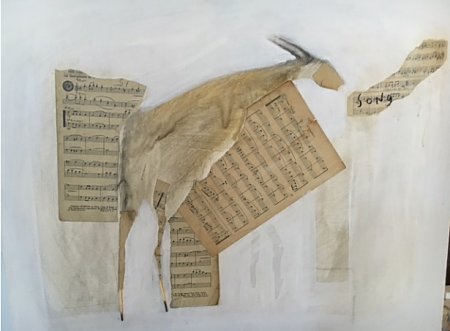
Receptions With the Poet
Mr. Howland gasped for air. “Yes, yes, but I thought it was a tuxedo!”
Later, both of us bundled in our winter coats, he drove me to my dorm in his tiny Volkswagen and slowed to a stop on Mass Ave in front of Wyeth Hall. He said that once in a while a student comes along who makes teaching fun, makes you remember why you became a teacher in the first place, and I was one of those students, and he was grateful to me. I was so embarrassed I just sat there wishing to evaporate. “Thanks for coming to that thing with me,” he said. “Was it too awful?”
“No.”
He waited for me to find some words, and when I couldn’t he said, “Well, off you go,” and he leaned across me and opened the door, and I went out and hurried on the slushy sidewalk to the dorm, not knowing what to make of the evening except that it seemed I’d been privileged to witness something most people never see, a bunch of famous scholars acting like everyone else.
Months later, when the crocuses were fully up and forsythia was blooming, I heard that the poet Robert Lowell was going to read at my alma mater. I didn’t understand Robert Lowell’s poems, and I’d read that he was mean to Sylvia Plath, but I wanted to see Mr. Howland. It had been a year since my college graduation and six months since our reunion in Cambridge.
I was proud of my teacher for knowing famous poets. Robert Frost had come to the college and had seemed interested in what we’d had to say. James Merrill had taken over one of our writing seminars. He had seemed afraid we might pounce on him. Our hearts had gone out to him so much we had opened our journals and read aloud from them right in front of each other. I had not known that the world could accommodate such a mouse-like man.
Robert Lowell fit into that same category, man in excruciating pain, except that Robert Lowell wasn’t made of twigs. He was tall and slender, and even the intense worry on his face could not diminish his appealing masculinity. I still didn’t understand his poetry, but now at least, having heard him, I could pick out some of the rhymes. The reception after his reading was in a private home in New London. In a room of overstuffed furniture and velvet drapery, Lowell sat cowering in the corner of a sofa, shrinking from the eager New London matrons who converged on him hoping to engage in brainy conversation. This was a big event, and lots of planning by various New London clubwomen had gone into it. They didn’t seem to care that they might be talking too loudly or laughing too shrilly for his comfort. He belonged to them for that evening. They intended to make good use of this once-in-a-lifetime encounter with a literary giant. They fired questions at him about his writing style, his work habits, the meaning of this or that poem. His eyes were wild with fright, but he endured. This had happened to him dozens of times. It was part of the job.
There were forty or fifty people at the reception, a scattering of young people but mostly the prominent citizens of New London—trustees of the art museum, members of the historical society, officers of the Jane Austen Society. I munched from the buffet, sipped wine, and decided that I’d leave once I’d had a chance to say hello to Mr. Howland, who was continually surrounded by people. I had always thought of him as belonging to his students on campus, but now I saw that he was just as comfortable, maybe even more comfortable, with the adults who lived in New London. How did he know them? They were quite familiar with him, and a lot of laughter came from that corner of the room. Robert Lowell kept looking over there, pleading with his eyes to be rescued. After a couple of hours, he begged to be taken to his hotel, and that was the end of him, though not of the reception. The reception had a life of its own and, if anything, became livelier because the sofa that had been dominated by Lowell was now free, so three women, tired of standing in heels, sat down and started having fun together.
I crossed the oriental carpet to Mr. Howland’s armchair, intending to greet him and say goodbye at the same time. He was laughing and drinking, holding court, and I felt too young to interrupt, so I just stood in the middle of the room, caught his eye at last, and raised my hand in farewell.
